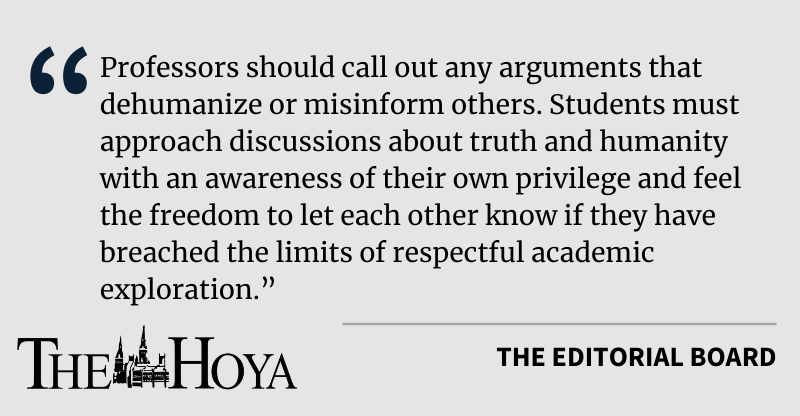Like many people in the United States and around the world, the Editorial Board was disturbed by last week’s violent attempt to overturn the presidential election results through an insurrection that briefly overwhelmed the U.S. Capitol. The threat it represents to the United States’ democratic government cannot be overstated. But this threat to America’s democratic elections did not begin with violence. It began with deceitful words of incitement — from President Donald Trump and his supporters — and ultimately with the systems and institutions that failed to hold accountable those who espoused prejudice and disinformation.
All institutions of higher education have a responsibility to teach their students to hold one another accountable in intellectual debates. Especially at universities like Georgetown University, whose graduates often end up in the United States’ most powerful institutions, future leaders must graduate prepared to unify in a world in which prejudice and disinformation retain a strong footing. The Editorial Board therefore calls on Georgetown and other higher education institutions to foster an environment on campus in which students and faculty learn to call out and educate each other when their discussions dehumanize marginalized groups or misinform others.
Politicians and journalists have cited the elite college educations of the leaders who promoted election conspiracies with incredulity: An editor for The Washington Post wrote that Sen. Josh Hawley (R-Mo.), having gone to Yale Law School, “surely knows better.” The chair of the Texas Democratic Party proclaimed that Sen. Ted Cruz (R-Texas), with his degrees from Princeton University and Harvard Law School, “knows better than this.”
But the prestigious backgrounds of these politicians did not preclude their championing of the conspiracy theories that inspired last week’s insurrection. Just days before the violence broke out, Cruz led 10 other senators in issuing a joint statement that falsely alleged widespread voter fraud in the election. Hawley raised a fist in apparent solidarity with the rioters just hours before they stormed the Capitol.
Universities like Georgetown — which has 28 graduates in Congress — can play a key role in ensuring that their graduates are never again involved in such hateful, dangerous and misinformed uprisings. Teaching future leaders to hold themselves and their peers accountable for actionable, dangerous speech starts at the university level.
College is often the place where students and future leaders develop, challenge and push the boundaries of their beliefs. All too often, however, this effort to explore and debate gives the false facade of intellectual neutrality to views that educators would otherwise consider too prejudiced or misinformed. The discussion and exploration of sensitive topics is an important part of learning, but professors and students must be careful that their discussions do not perpetuate bigotry.
Furthermore, members of academic communities must remain open to objections and be earnest about learning from one another — particularly when their speech furthers hateful ideals. At Georgetown, students and faculty are expected to hold their discussions to these standards, according to a university spokesperson.
“We expect University classrooms, and any interaction between students and faculty, to be free of bias and geared toward thoughtful, respectful dialogue. Hate speech, or speech inciting violence, is never appropriate in a university classroom,” the spokesperson wrote in an email to The Hoya. “Faculty have access to a variety of resources relating to expanding skills in facilitating difficult conversations.”
Despite these expectations, Georgetown students experience intellectual bigotry in the classroom, often during poorly framed or moderated discussions. Georgetown student Amina Sadural (SFS ’22) noted this discrepancy in reference to her experience with a classroom debate.
“I can’t speak to people’s intentions but the discussion ‘moderator’ always chose neutrality in the face of sexism, Islamophobia, and racism, among other forms of oppression,” Sadural wrote in an email to The Hoya. “When professors and TAs are neutral in the face of racism, Islamophobia, queerphobia, classism, etc., they are complicit in it. And they empower the students who voice their prejudice. That’s not neutrality; that’s complicity in the harming of students in the classroom.”
Accountability must take on greater importance in these conversations. Professors should call out any arguments that dehumanize or misinform others. Students must approach discussions about truth and humanity with an awareness of their own privilege and feel the freedom to let each other know if they have breached the limits of respectful academic exploration.
This framework is already in place within some communities at Georgetown. For instance, the Philodemic Society hosts high quality, productive debates using these guidelines, according to the organization’s Officer Corps.
“In the 1800s, the Philodemic frequently debated topics of slavery and race,” the Officer Corps wrote in an email to The Hoya. “Resolutions like these, which put people’s human rights and autonomy into question, should never be debated on the Philodemic floor again.”
As far as accountability goes, the Philodemic Society has procedures, developed with the Center for Student Engagement, in place to handle incendiary speech. The organization works to “call in” offensive speakers by pulling them aside to have conversations about incendiary speech. When necessary, the debate’s presiding officer can gavel down speakers. Beyond official club debates, the Philodemic Society provides its members with educational workshops and events to identify their biases and challenge any discriminatory practices.
Given last week’s violence, now is the time to develop a culture of accountability so election season insurrections don’t become politics as usual. Using a framework like the Philodemic Society’s, universities can cultivate future leaders who will hold each other to account before they even begin their careers.
Georgetown, alongside all other U.S. universities, must take action to better prepare professors and students to hold each other accountable for offensive, provocative speech. Without these reforms, our future leaders will continue to fail each other, their constituents and this nation.
The Hoya’s editorial board is composed of six students and is chaired by the opinion editor. Editorials reflect only the beliefs of a majority of the board and are not representative of The Hoya or any individual member of the board.









